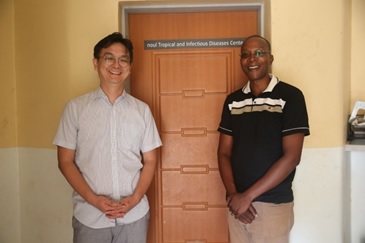Noul, a local blood-diagnosis startup, said Tuesday that it has signed a collaborative research agreement with Wezi Medical Center, a hospital in Malawi, East Africa.

Under the accord, the company has established a tropical and infectious disease (TID) center at the hospital. The TDI center will focus on diagnosing fever for malaria and antibiotic resistance as its first goal. Africa accounts for 92 percent of the global malaria outbreak, which affects more than 200 million people every year.
Malaria is an illness accompanied by severe fever and anemia. Although the disease is treatable, it can lead to death if left untreated. Until now, rapid diagnostic tests and microscopic readings have been the primary methods to diagnose malaria.
In Africa, however, there is a need for additional test methods as the conventional methods have low diagnostic accuracy and sensitivity, while the tests are also time-consuming and labor costs for laboratories and skilled technicians are high.
Regarding antibiotic resistance, the company mentioned febrile illness as an example.
“The disease is largely divided into viral and bacterial,” the company said. “However, antibiotics, which should be prescribed only for the bacterial-form, are being abused by all patients in the absence of diagnostic solutions.”
The World Health Organization lists antibiotic resistance issues as the biggest threat to global health today, it added.
The company expects that medical professionals will be able to determine whether to prescribe antibiotics if they have a solution that can determine if the patient's heat source is bacteria or not.
As there is no simple, inexpensive solution for antibiotic prescription guidance, Noul is developing a next-generation field-of-the-art diagnostic tool, which can quickly and easily confirm fever diagnosis for malaria and antibiotic prescription guidance on-site.
The agreement is based mainly on Micro-Intelligent Laboratory (miLab), the company’s blood diagnostic device platform that automates and validates all processes of microscopic blood diagnosis that were available only in existing large hospitals and laboratories.
The device is a technology that quickly scans and automatically analyzes blood cell images using a cartridge containing a drop of blood from the fingertip. Afterward, through data learning, it enables diagnosis and real-time data management of various diseases including malaria, blood diseases, infectious diseases, immune diseases, and cancer.
Such a process makes it possible to diagnose quickly and accurately in developing countries.
“The UN’s Sustainable Development Goals (SDG) specifies global goals to combat tropical infectious diseases such as malaria and maximize access to health care,” Noul CEO Lee Dong Young said. “To this end, Noul is proud to demonstrate innovative diagnostic solutions through its TDI center, bringing a systematic change to the in-vitro diagnostic process around the world.”
In particular, the company plans to begin clinical research to find new solutions for severe issues of antibiotic resistance as well as malaria diagnosis, Lee added.
Wezi Medical Center President Douglas Lungu also said, “The hospital expects that the establishment of the TID center will open a new dimension. Although It would have taken years if the hospital tried to research the subject on its own, with the cooperation of Noul's TID Center we will be able to expose and introduce more advanced technologies more quickly.”

